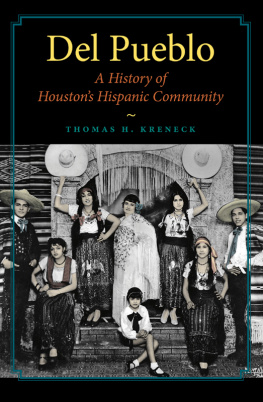Mónica Perales - Recovering the Hispanic History of Texas
Here you can read online Mónica Perales - Recovering the Hispanic History of Texas full text of the book (entire story) in english for free. Download pdf and epub, get meaning, cover and reviews about this ebook. year: 2010, publisher: Arte Público Press, genre: Politics. Description of the work, (preface) as well as reviews are available. Best literature library LitArk.com created for fans of good reading and offers a wide selection of genres:
Romance novel
Science fiction
Adventure
Detective
Science
History
Home and family
Prose
Art
Politics
Computer
Non-fiction
Religion
Business
Children
Humor
Choose a favorite category and find really read worthwhile books. Enjoy immersion in the world of imagination, feel the emotions of the characters or learn something new for yourself, make an fascinating discovery.

- Book:Recovering the Hispanic History of Texas
- Author:
- Publisher:Arte Público Press
- Genre:
- Year:2010
- Rating:4 / 5
- Favourites:Add to favourites
- Your mark:
Recovering the Hispanic History of Texas: summary, description and annotation
We offer to read an annotation, description, summary or preface (depends on what the author of the book "Recovering the Hispanic History of Texas" wrote himself). If you haven't found the necessary information about the book — write in the comments, we will try to find it.
The eight essays included in this volume examine the dominant narrative of Texas history and seek to establish a record that includes both Mexican men and women, groups whose voices have been notably absent from the history books.
Finding documents that reflect the experiences of those outside of the mainstream culture is difficult, since historical archives tend to contain materials produced by the privileged and governing classes of society. The contributing scholars make a case for expanding the notion of archives to include alternative sources. By utilizing oral histories, Spanish-language writings and periodicals, folklore, photographs, and other personal materials, it becomes possible to recreate a history that includes a significant part of the states population, the Mexican community that lived in the area long before its absorption into the United States.
These articles, originally presented as part of the Hispanic History of Texas Projects first conference held in conjunction with the Texas State Historical Associations annual conference in 2008, primarily explore themes within the field of Chicano/a Studies. Divided into three sections, Creating Social Landscapes, Racialized Identities, and Unearthing Voices, the pieces cover issues as diverse as the Mexican-American Presbyterian community, the female voice in the history of the Texas borderlands, and Tejano roots on the Louisiana-Texas border in the 18th and 19th centuries.
In their introduction, editors Monica Perales and Ral A. Ramos write that the scholars, in their exploration of the states history, go beyond the standard categories of immigration, assimilation, and the nation state. Instead, they forge new paths into historical territories by exploring gender and sexuality, migration, transnationalism and globalization.
Mónica Perales: author's other books
Who wrote Recovering the Hispanic History of Texas? Find out the surname, the name of the author of the book and a list of all author's works by series.




 The paper used in this publication meets the requirements of the American National Standard for Information SciencesPermanence of Paper for Printed Library Materials, ANSI Z39.48-1984.
The paper used in this publication meets the requirements of the American National Standard for Information SciencesPermanence of Paper for Printed Library Materials, ANSI Z39.48-1984.